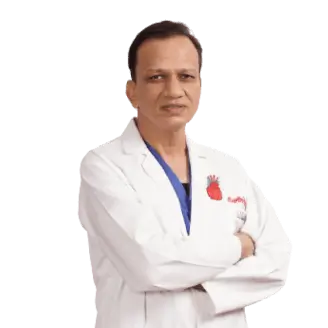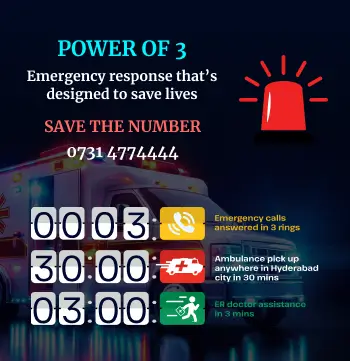Best Heart Transplant Hospital in Indore
Heart transplantation is a medical procedure that falls under the purview of interventional cardiology and involves replacing a diseased or failing heart with a healthy donor heart. Heart failure is a condition in which the heart does not function optimally, as it should. Heart transplantation may be considered as a last option if other treatments, such as medications or surgeries, have not successfully treated certain heart conditions.
Comprehensive interventional cardiac surgery and heart transplant procedures are routinely performed within the Cardiac Department at CARE CHL Hospitals Indore. These procedures aim to repair birth defects as well as address medical conditions of the heart in paediatric, adult, and geriatric patients.
A collaborative team of interventional cardiologists, cardiac surgeons, consultants, and other interdisciplinary specialists work together to provide world-class healthcare services and support, utilising a multidisciplinary approach to address major and minor comorbidities in patients with heart ailments. With state-of-the-art facilities and cutting-edge equipment for interventional procedures, the Cardiac Department at CARE CHL Hospitals Indore has been established as a Center of Excellence, offering exceptional medical services and a high rate of success in cardiac treatments.
Who is Eligible to be a Recipient?
Not every patient with heart failure may be a suitable candidate for a heart transplant, as it can pose significant risks to them. Before placing a patient on the heart transplant recipient list, the team of doctors thoroughly scrutinises their health condition and assesses their need for a transplant, considering factors such as age, lifestyle, and comorbidities.
Several factors can influence a patient's eligibility to become a heart transplant recipient, including:
- Comorbidities: Certain comorbidities can reduce the chances of long-term survival after a heart transplant.
- Active Infections: An active infection could lead to severe complications in the context of a heart transplant.
- Recovery Potential: If a patient is deemed unlikely to recover effectively after the heart transplant, doctors may opt against the procedure.
- Cancer History: Patients with a family history of cancer may not be recommended for a heart transplant
Understanding the Heart Transplantation Process
Once a patient has been identified as a potential recipient for a heart transplant, they may be placed on a waiting list. While on the waiting list, doctors closely monitor the patient's health until a donor heart becomes available. Sometimes, the patient may recover from the heart condition they were suffering from, which could lead to their removal from the waiting list. However, depending on the patient's recovery, they might be placed back on the waiting list.
Preparing for a Heart Transplant
Doctors may recommend a treatment plan based on the estimated wait time for a donor heart. Patient education about the current treatment plan and the cardiac rehabilitation process is provided, focusing on knowledge about maintaining health before and after the transplant. Emotional and psychological evaluation and management are also emphasised to prepare patients for the transplant procedure.
Heart Transplant Procedure
Heart transplantation surgery is a complex procedure tailored to the individual patient's needs. A dedicated team of cardiac surgeons and other specialists is responsible for the patient's care throughout the procedure. Typically, a heart transplant surgery takes about 4-6 hours to complete. The procedure is performed under general anaesthesia, while the patient remains connected to a heart-lung bypass machine to ensure a continuous supply of oxygen-rich blood.
During the surgery, an incision is made down the breastbone (sternum), and the patient is connected to a heart-lung bypass machine, which takes over the functions of the heart and lungs. With the rib cage open, the cardiac surgeons remove the diseased heart and replace it with the healthy donor heart. The major blood vessels are then attached to the new heart, allowing blood to flow through it, prompting it to beat normally. If the donor heart encounters difficulties in maintaining proper rhythm, normal heartbeats can be restored through electric shocks.
Post Transplant Rehabilitation & Care
After the heart transplant process has been completed, the patient may be prescribed pain-relieving medications. They will be kept in the intensive care unit (ICU) for close supervision and monitoring for several days. Additionally, the patient might be connected to a ventilator and a fluid drainage system to facilitate the removal of fluids after the surgery, as well as to receive necessary medications and fluids.
After a few days, the patient will be transferred from the ICU to a hospital room for further evaluation and rehabilitation. Once it is ensured that the patient is well enough to return home, they will be discharged from the hospital. However, they will still require regular monitoring of their health. Individuals who undergo heart transplants typically experience an improved quality of life by adhering to their doctor's instructions. Generally, immunosuppressants are prescribed to minimise the risk of organ rejection.
During a routine post-surgical evaluation, doctors may perform certain tests to ensure that a transplanted heart is functioning optimally and is not being rejected by the body. These tests may include biopsies and electrocardiograms, particularly in the initial months following the surgery. This vigilance is essential as signs of organ rejection, especially in the case of a transplanted heart, might not always be evident.
However, occasionally there could be symptoms that indicate rejection of the transplanted heart. These symptoms may encompass:
- Unexplained weight gain
- Shortness of breath, fatigue
- Reduced frequency of urination
Risks and Complications
A heart transplant is a major operation that may entail certain risks and complications. The risks associated with heart transplant surgery can include:
- Heart rejection
- Blood clots
- Infection
- Kidney damage, osteoporosis, high blood pressure, and diabetes due to immunosuppressants
- Decreased immunity
- Cancer
- Coronary artery diseases such as heart attacks, heart failures, abnormal heart rhythms, etc.
While complications may occur as a heart transplant surgery is a major surgery, they occur rarely and may be promptly taken care of as the patients are kept under observation and regularly checked for post-surgical complications for a considerable period of time.
At the Cardiac Department of CARE CHL Hospitals Indore, we are dedicated to providing top-notch treatment and management for a variety of heart ailments. This includes performing and effectively managing complications related to heart transplants with the highest level of expertise and skill. Our team consists of highly experienced cardiologists and cardiac surgeons who approach each patient with acute clinical acumen and exceptional care. Our goal is to provide precise evaluations and treatments for all heart-related health conditions.




